 W
WHarry Igor Ansoff was a Russian American applied mathematician and business manager. He is known as the father of strategic management.
 W
WHenry Harley Arnold was an American general officer holding the ranks of General of the Army and General of the Air Force. Arnold was an aviation pioneer, Chief of the Air Corps (1938–1941), Commanding General of the United States Army Air Forces, the only United States Air Force general to hold five-star rank, and the only officer to hold a five-star rank in two different U.S. military services. Arnold was also the founder of Project RAND, which evolved into one of the world's largest non-profit global policy think tanks, the RAND Corporation, and one of the founders of Pan American World Airways.
 W
WKenneth Joseph Arrow was an American economist, mathematician, writer, and political theorist. He was the joint winner of the Nobel Memorial Prize in Economic Sciences with John Hicks in 1972.
 W
WRobert John Aumann is an Israeli-American mathematician, and a member of the United States National Academy of Sciences. He is a professor at the Center for the Study of Rationality in the Hebrew University of Jerusalem in Israel. He also holds a visiting position at Stony Brook University, and is one of the founding members of the Stony Brook Center for Game Theory.
 W
WPaul Baran was a Polish-American engineer who was a pioneer in the development of computer networks. He was one of the two independent inventors of packet switching, which is today the dominant basis for data communications in computer networks worldwide, and went on to start several companies and develop other technologies that are an essential part of modern digital communication.
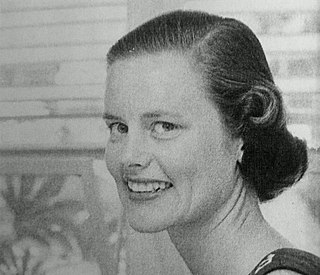 W
WSharla Boehm, née Perrine, is an American computer scientist who carried out pioneering work in packet switching while working for the RAND Corporation in the 1960s.
 W
WPaul Bracken is a professor of political science and business at Yale University.
 W
WBernard Brodie was an American military strategist well known for establishing the basics of nuclear strategy. Known as "the American Clausewitz," and "the original nuclear strategist," he was an initial architect of nuclear deterrence strategy and tried to ascertain the role and value of nuclear weapons after their creation.
 W
WArthur C. Brooks is an American social scientist, musician, and contributing opinion writer for The Washington Post. He was the president of the American Enterprise Institute, a conservative think tank, for a decade. As of July 2019, he joined the faculty of the Harvard Kennedy School and Harvard Business School. Brooks has researched the junctions between culture, economics, and politics. He is the author of 11 books, including two New York Times best sellers: The Road to Freedom: How to Win the Fight for Free Enterprise (2012) and The Conservative Heart: How to Build a Fairer, Happier, and More Prosperous America. Politically, he is a center-right independent and a libertarian.
 W
WDavid S. C. Chu is a retired American civil servant and consultant.
 W
WSamuel Theodore Cohen was an American physicist who is generally credited as the father of the neutron bomb.
 W
WGeorge Bernard Dantzig was an American mathematical scientist who made contributions to industrial engineering, operations research, computer science, economics, and statistics.
 W
WDonald Wills Douglas Sr. was an American aircraft industrialist and engineer.
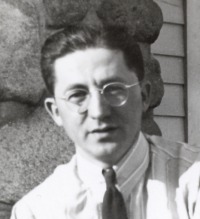 W
WMelvin Dresher was a Polish-born American mathematician, notable for developing, with Merrill Flood, the game theoretical model of cooperation and conflict known as the Prisoner's dilemma while at RAND in 1950.
 W
WDaniel Ellsberg is an American economist, political activist, and former United States military analyst who, while employed by the RAND Corporation, precipitated a national political controversy in 1971 when he released the Pentagon Papers, a top-secret Pentagon study of the U.S. government decision-making in relation to the Vietnam War, to The New York Times, The Washington Post and other newspapers.
 W
WYoshihiro Francis Fukuyama is an American political scientist, political economist, and writer. Fukuyama is known for his book The End of History and the Last Man (1992), which argues that the worldwide spread of liberal democracies and free-market capitalism of the West and its lifestyle may signal the end point of humanity's sociocultural evolution and become the final form of human government. However, his subsequent book Trust: Social Virtues and Creation of Prosperity (1995) modified his earlier position to acknowledge that culture cannot be cleanly separated from economics. Fukuyama is also associated with the rise of the neoconservative movement, from which he has since distanced himself.
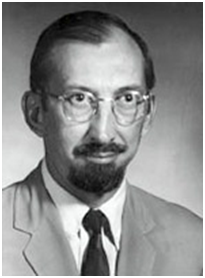 W
WDelbert Ray Fulkerson was an American mathematician who co-developed the Ford–Fulkerson algorithm, one of the most well-known algorithms to solve the maximum flow problem in networks.
 W
WDavid Charles Gompert is an American government official and former diplomat who served as the acting Director of National Intelligence (DNI) following the resignation of Dennis C. Blair in 2009. Prior to his ascension as DNI, he was Principal Deputy Director of National Intelligence and continued serving in that capacity until 2011.
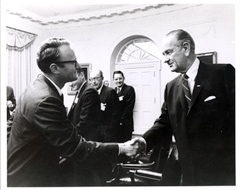 W
WWilliam "Bill" Gorham is an American economist and founding president of the Urban Institute, a Washington, D.C.-based social and economic policy think tank.
 W
WWilliam Robert Graham is an American physicist who was chairman of President Reagan's General Advisory Committee on Arms Control from 1982 to 1985, a deputy administrator and acting administrator of NASA during 1985 and 1986, and director of the White House Office of Science and Technology Policy and concurrently science adviser to President Reagan from 1986 to 1989. He then served as an executive in national security-related companies.
 W
WJerrold D. Green is the president and chief executive officer of the Pacific Council on International Policy in Los Angeles, California. He is concurrently a research professor at the University of Southern California Annenberg School for Communication and Journalism.
 W
WThane Gustafson is a professor of political science at Georgetown University, Washington, D.C., United States. He specializes in comparative politics and the political history of Russia and the former USSR.
 W
WJames Day Hodgson was an American politician. He served as the Secretary of Labor and the Ambassador to Japan.
 W
WThe Hudson Institute is a politically conservative, 501(c)(3) non-profit American think tank based in Washington, D.C. It was founded in 1961 in Croton-on-Hudson, New York, by futurist, military strategist, and systems theorist Herman Kahn and his colleagues at the RAND Corporation.
 W
WLeonid "Leo" Hurwicz was a Polish-American economist and mathematician, known for his work in game theory and mechanism design. He originated the concept of incentive compatibility, and showed how desired outcomes can be achieved by using incentive compatible mechanism design. Hurwicz shared the 2007 Nobel Memorial Prize in Economic Sciences for his seminal work on mechanism design. Hurwicz was one of the oldest Nobel Laureates, having received the prize at the age of 90.
 W
WHerman Kahn was a founder of the Hudson Institute and one of the preeminent futurists of the latter part of the twentieth century. He originally came to prominence as a military strategist and systems theorist while employed at the RAND Corporation. He became known for analyzing the likely consequences of nuclear war and recommending ways to improve survivability, making him one of the historical inspirations for the title character of Stanley Kubrick's classic black comedy film satire Dr. Strangelove.
 W
WWilliam Weed Kaufmann was an American nuclear strategist and adviser to seven defense secretaries, who advocated for a shift from the strategy of massive retaliation against the Soviet Union in the event of a nuclear strike.
 W
WZalmay Mamozy Khalilzad is an Afghan-American diplomat, who has served as the Special Representative for Afghanistan Reconciliation at the State Department since September 2018. Previously, he served as a counselor at the Center for Strategic and International Studies (CSIS) and the president of Gryphon Partners and Khalilzad Associates, an international business consulting firm, based in Washington, D.C.
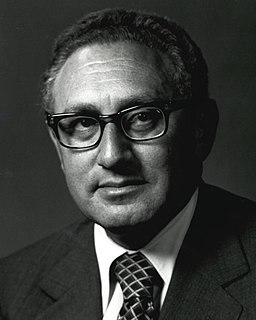 W
WHenry Alfred Kissinger is an American politician, diplomat, and geopolitical consultant who served as United States Secretary of State and National Security Advisor under the presidential administrations of Richard Nixon and Gerald Ford. A Jewish refugee who fled Nazi Germany with his family in 1938, he became National Security Advisor in 1969 and U.S. Secretary of State in 1973. For his actions negotiating a ceasefire in Vietnam, Kissinger received the 1973 Nobel Peace Prize under controversial circumstances, with two members of the committee resigning in protest.
 W
WAndrew W. Marshall was an American foreign policy strategist who served as director of the United States Department of Defense's Office of Net Assessment from 1973 to 2015. Appointed to the position by President Richard Nixon, Marshall remained in office during all successive administrations that followed until his retirement on January 2, 2015. He was succeeded in the role by James H. Baker.
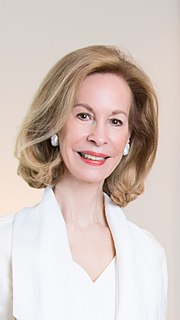 W
WMary Bonneau "Bonnie" McElveen-Hunter is an American businesswoman, philanthropist, and diplomat who is the first female Chair of the Board of Governors of the American Red Cross. She is the founder and CEO of Pace Communications, a content and integrated marketing agency, and was the U.S. Ambassador to Finland from 2001 to 2003. She served as the finance chairwoman of Elizabeth Dole's campaign for the Republican nomination for U.S. president. She also started the first billion dollar women's leadership campaign in America for the United Way.
 W
WJohn von Neumann was a Hungarian-American mathematician, physicist, computer scientist, engineer and polymath. Von Neumann was generally regarded as the foremost mathematician of his time and said to be "the last representative of the great mathematicians". He integrated pure and applied sciences.
 W
WWilliam Arthur Niskanen was an American economist. He was one of the architects of President Ronald Reagan's economic program and contributed to public choice theory. He was also a long-time chairman of the Cato Institute, a libertarian think-tank.
 W
WPaul Henry O'Neill served as the 72nd United States Secretary of the Treasury for part of President George W. Bush's first term, from January 2001 to December 2002. He was fired in December 2002 for his public disagreement with the administration. Prior to his term as Secretary of the Treasury, O'Neill was chairman and CEO of industrial giant Alcoa and chairman of the RAND Corporation.
 W
WRan Ronen was an ace fighter pilot and commander in the Israeli Air Force (IAF), credited with seven kills. He commanded various fighter squadrons, the IAF flight academy, and the Tel Nof Airbase, retiring from the IAF with the rank of Brigadier General. One of his pilots later described him as "the greatest squadron commander ever".
 W
WBernard Daniel Rostker was Principal Deputy Assistant Secretary of the Navy from 1977 to 1979; Director of the United States Selective Service System from 1979 to 1981; Assistant Secretary of the Navy from 1994 to 1998; Under Secretary of the Army from 1998 to 2000; and Under Secretary of Defense for Personnel and Readiness in 2000-2001. From 1996 to 2001, he also served as Special Assistant to the Deputy Secretary of Defense for Gulf War Illnesses.
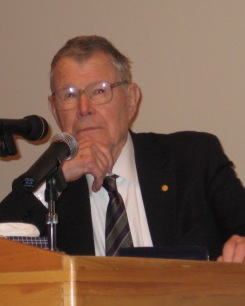 W
WThomas Crombie Schelling was an American economist and professor of foreign policy, national security, nuclear strategy, and arms control at the School of Public Policy at University of Maryland, College Park. He was also co-faculty at the New England Complex Systems Institute. He was awarded the 2005 Nobel Memorial Prize in Economic Sciences for "having enhanced our understanding of conflict and cooperation through game-theory analysis."
 W
WLloyd Stowell Shapley was an American mathematician and Nobel Prize-winning economist. He contributed to the fields of mathematical economics and especially game theory. Shapley is generally considered one of the most important contributors to the development of game theory since the work of von Neumann and Morgenstern. With Alvin E. Roth, Shapley won the 2012 Nobel Memorial Prize in Economic Sciences "for the theory of stable allocations and the practice of market design."
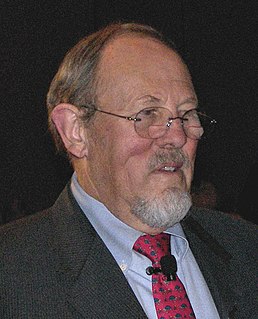 W
WWilliam Forsyth Sharpe is an American economist. He is the STANCO 25 Professor of Finance, Emeritus at Stanford University's Graduate School of Business, and the winner of the 1990 Nobel Memorial Prize in Economic Sciences.
 W
WSimon Oliver Sinek is a British-American author and inspirational speaker. He is the author of five books, including Start With Why (2009) and The Infinite Game (2019).
 W
WRichard Harvey Solomon was an American diplomat and academic who served as Director of Policy Planning from 1986 to 1989, Assistant Secretary of State for East Asian and Pacific Affairs from 1989 to 1992, and U.S. Ambassador to the Philippines from 1992 to 1993. In September 1993, he became president of the United States Institute of Peace, a position he held until September 2012. He subsequently joined the RAND Corporation as a Senior Fellow.
 W
WClay T. "Tom" Whitehead was a United States government official who served as Special Assistant to the President from 1968-1970; Director of the White House Office of Telecommunications Policy (OTP) from 1970 to 1974 during the Nixon administration; Director of the Ford Transition Team immediately before Nixon's resignation; and an operative in the White House during the initial phases of the Ford transition. Whitehead pioneered a policy of competition across the telecommunications industries, which later was reflected in legislation and regulations in the United States and around the world.
 W
WAlbert James Wohlstetter was an American political scientist noted for his influence on U.S. nuclear strategy during the Cold War. He and his wife Roberta Wohlstetter, an accomplished historian and intelligence expert, received the Presidential Medal of Freedom from Ronald Reagan on November 7, 1985.